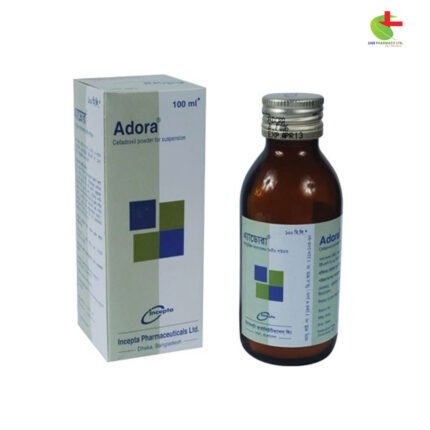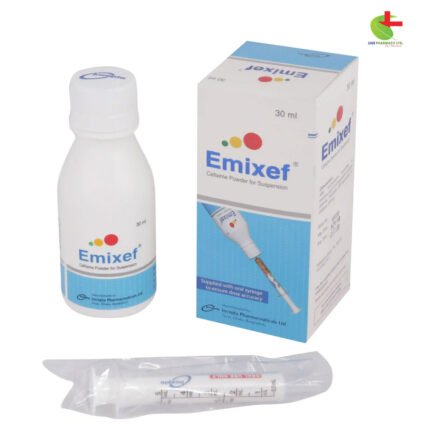Emixef DS
320.00৳ Bottle (50ml)
- Emixef DS is a third-generation cephalosporin antibiotic effective against a broad spectrum of Gram-positive and Gram-negative bacteria.
- It is indicated for treating various infections, including upper and lower respiratory tract infections and urinary tract infections.
- The recommended dosage varies by age and severity of infection, typically ranging from 200-400 mg daily for adults and 8 mg/kg/day for children.
- Emixef DS is generally well-tolerated, with mild gastrointestinal disturbances being the most common side effects.
- Caution is advised in patients with a history of hypersensitivity to cephalosporins or penicillins.
 Brand
Brand
|
Incepta Pharmaceuticals Ltd |
|---|---|
 Generics
Generics
|
Cefixime Trihydrate |
 Type
Type
|
Powder for Suspension |
Indications
Emixef DS is an orally administered cephalosporin antibiotic known for its strong bactericidal activity against a broad spectrum of Gram-positive and Gram-negative bacteria. It is recommended for the treatment of various acute infections caused by susceptible microorganisms, including:
- Upper Respiratory Tract Infections (URTI): Such as otitis media and other URTIs where the bacteria may be resistant to commonly prescribed antibiotics, or where treatment failure could pose significant risks.
- Lower Respiratory Tract Infections: Including conditions like bronchitis.
- Urinary Tract Infections: Such as cystitis, cystourethritis, and pyelonephritis. Clinical effectiveness has been shown against common pathogens, including Streptococcus pneumoniae, Streptococcus pyogenes, Escherichia coli, Proteus mirabilis, Klebsiella species, Haemophilus influenzae (both beta-lactamase positive and negative), Moraxella catarrhalis (beta-lactamase positive and negative), and Enterobacter species. Notably, Emixef DS maintains high stability against beta-lactamase enzymes.
Consult a registered physician before using this medication.
Pharmacology
Cefixime, a third-generation semi-synthetic cephalosporin antibiotic for oral use, exhibits bactericidal properties against a wide range of Gram-positive and Gram-negative bacteria at easily achievable plasma concentrations. It works by disrupting the synthesis of the bacterial cell wall and is notably stable in the presence of beta-lactamase enzymes. This stability allows many bacteria resistant to penicillins and some cephalosporins to remain susceptible to Cefixime. Its absorption ranges from 40% to 50%, regardless of food intake.
Dosage & Administration
Cefixime absorption is minimally affected by food. The typical treatment duration is 7 days, extendable to 14 days if necessary.
- Adults and Children Over 10 Years: The usual dosage is 200-400 mg daily, depending on the infection’s severity, either as a single dose or divided into two doses.
- Elderly Patients: Can receive the same dosage as adults, but renal function should be assessed, and dosage adjusted in cases of severe renal impairment.
- Children: The recommended dosage is 8 mg/kg/day, administered either as a single dose or in two divided doses. Typical daily doses for children are as follows:
- 6 months to 1 year: 3.75 ml daily
- 1-4 years: 5 ml daily
- 5-10 years: 10 ml daily
For typhoid, the recommended dosage for children is 5 mg/kg body weight twice daily for 10-14 days.
Children over 50 kg or older than 10 years should be treated with the adult dosage of 200-400 mg daily, depending on infection severity.
- Children Under 6 Months: Safety and efficacy of Cefixime have not been established.
- Renal Impairment: In patients with creatinine clearance greater than 20 ml/min, the normal dose can be administered. For patients with creatinine clearance less than 20 ml/min, the maximum dose should not exceed 200 mg once daily. Patients undergoing chronic ambulatory peritoneal dialysis or hemodialysis should follow the same recommendations as those with creatinine clearance below 20 ml/min.
Consult a registered physician before using this medication.
Interactions
As with other cephalosporins, some patients may experience increases in prothrombin times. Caution is advised for patients on anticoagulant therapy.
Contraindications
Avoid use in patients with a known hypersensitivity to cephalosporin antibiotics.
Side Effects
Emixef DS is generally well tolerated, with most adverse reactions observed during clinical trials being mild and self-limiting. Common gastrointestinal side effects include diarrhea and stool alterations, particularly associated with higher doses. Other less frequent gastrointestinal effects may include nausea, abdominal pain, dyspepsia, vomiting, and flatulence. Pseudomembranous colitis has been reported.
Central nervous system effects may include headache and dizziness. Hypersensitivity reactions can manifest as rashes, pruritus, urticaria, drug fever, and arthralgia, typically resolving upon discontinuation of the medication. Hematological effects such as thrombocytopenia, leukopenia, and eosinophilia have been noted but are infrequent and reversible. Mild, transient changes in liver and renal function tests may occur, along with other possible reactions like genital pruritus and vaginitis.
Pregnancy & Lactation
Currently, there are no adequate and well-controlled studies in pregnant women. Due to the unpredictability of animal reproduction studies in predicting human response, Emixef DS should only be used during pregnancy if clearly needed. The excretion of Cefixime in human milk is not established; therefore, caution is advised when administering to nursing mothers.
Precautions & Warnings
Cefixime should be administered cautiously to patients with a history of hypersensitivity to other medications. Cephalosporins should be given carefully to individuals with penicillin sensitivity, as cross-reactivity between the two classes of antibiotics has been documented. If any allergic reactions occur, Emixef DS should be discontinued, and appropriate treatment should be provided. Additionally, caution is advised in patients with significantly impaired renal function.
Broad-spectrum antibiotics may disrupt normal colonic flora, leading to the overgrowth of Clostridium difficile, which is a primary cause of antibiotic-associated diarrhea.
Overdose Effects
In cases of overdose, gastric lavage may be indicated; otherwise, there is no specific antidote. Emixef DS is not significantly removed from the bloodstream through hemodialysis or peritoneal dialysis. Adverse reactions in small groups of healthy adult volunteers receiving single doses up to 2 g were similar to those seen in patients taking the recommended doses.
Therapeutic Class
Third-generation Cephalosporins.
Storage Conditions
Store below 30ºC, shielded from light and moisture. Keep out of reach of children.













Reviews
There are no reviews yet.